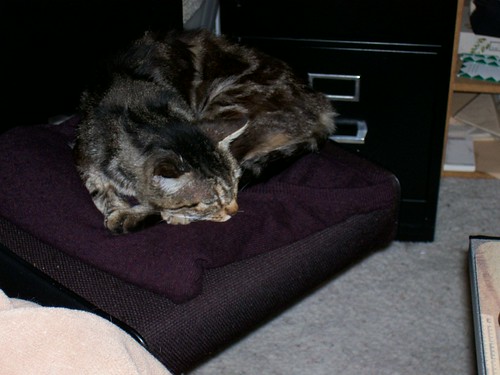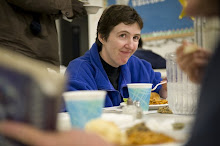Last night, the Younger Adults group at my parish got together for dinner in the Castro. My rector mentioned that he was speaking about Katrina today at a UTO function at St. Timothy's, Danville, and asked me to come and share my experiences. With one day's notice, I tweaked what I had already prepared, and added a few more stories.
I am loving doing this. I have really found a piece of my calling.
I went to New Orleans because my friend Michael invited me. What I found there changed me forever. I met God, and God’s people, there.
I went with three other CDSP students, over our Spring Break, during the last week of March. We worked with a local grassroots nonprofit. Michael gutted houses, which is still the most needed physical task there, as taking people’s houses apart from the inside, down to the studs, preserves people’s property rights should they want to return. Judy, Vivian, and I divided our time between a women’s shelter and a distribution center, in the 9th Ward. We met people whose stories will stay with us forever.
We met Joanne, a cargo worker at the Port of New Orleans. She was staying in a three-bedroom house with 16 other women. Her second home since Katrina was condemned, two weeks before I met her. The storm pushed sea water underneath the city. Nineteen months later, the water was still underground. The water corrodes the pipes, ultimately destroying the plumbing. The problem is extensive, and costly to fix. Joanne has been all over the world. New Orleans is her favorite place. She loves the city—but she struggles to survive there, after the storm.
We saw signs everywhere that read, “We are rebuilding. We are New Orleans. We are coming home.” The more I learned about the geographic realities and the political situation there, the more that made me wonder. But many could not afford to leave. Some who did evacuate are coming back. New Orleans just last week passed the halfway point of their pre-Katrina population. I’ve read the writings of some evacuees who stayed in Houston or Memphis or wherever they landed. They miss New Orleans so much. It’s not just a city on a random map of the U.S. It’s a culture unto itself. And it is their home.
Joanne led us to Bill, the rector of St. Anna’s Episcopal Church. Joanne had told us that she was drunk for a year after Katrina, and that this church had led her back to God. We attended Eucharist on a Wednesday night, drawn both by her witness and by the Mission to Musicians benefit potluck they host every week. Bill said that he, along with most other New Orleanians, simmered with anger underneath the surface. But when I asked him what he would have me take back to California, he said to me, “Peace. Hope. And send us money.” Musicians in New Orleans are craftspeople. They lost half their income in one single day. Churches there are very active in relief work. They are working to help the people, and the culture, survive.
I remember sitting in church that night, sobbing. We’d been in the 9th Ward for several days, meeting and talking with the people, hearing their stories. Sitting in this church, being part of the service, listening to the music, it all crashed down on me. I realized, people can suffer so much, and still be beautiful. I had several experiences there that confirmed a calling in me to work in forsaken places. I spent a lot of time there honestly horrified. This night is when I really fell in love with this city.
We took a day to play, and had lunch in the French Quarter at the New Orleans School of Cooking. When they found out what we’d been doing, wealthy locals out touristing thanked us just as whole-heartedly as the residents of the 9th Ward had, just for noticing them. The chef thanked the out-of-town tourists as deeply as he thanked us. If any of you are thinking of going to New Orleans, please do. It’s important that you witness to the devastation in that city. It is also important to go and have fun there. There’s a lot to make you think, in New Orleans. There’s also a lot to love. The Quarter is still a really fun place. Tourism has always been important, and that’s even more true now. Putting money into their economy helps them survive, and it will help them rebuild.
I thought I knew what poverty was. I didn’t. No amount of reading, or seeing photographs, could have prepared me for block after block after block after block of empty, flood-damaged houses, or for being out driving, for hours, in absolutely no traffic. Nothing could have prepared me for the shock of standing in the kitchen at the shelter, being shown a map of the city, and coming to really understand the geographic, economic, and political causes of this flood that took six weeks to pump dry. I came face to face with a deep sense of forgottenness in the people. Volunteers have come to their city to help them. The government has not. I met so many people who were so poor and yet so faithful, who lived with their souls almost visible. They were so grateful to be seen, to be spoken to, to be helped, to be remembered. We were a sign of hope to them; a sign of God’s presence. They were a sign of God’s presence to us.
Going to New Orleans changed me forever. I have a new commitment to mission, a new understanding of the political and economic forces in my own country, and a new empathy for people in all third-world situations. I had to keep consciously reminding myself, "I am in a major American city," because it did not look or feel like that. I’m planning to go back in January, to do an oral history project in connection with the Diocese of Louisiana. I urge you to go, if you can, to help out, to meet the people, to experience the place. Keep thinking about them; keep praying for them. Thank you for what you have given already.
Thank you for listening.





